Intensive Reading | "2019 China Blockchain Industry Development Report": a comprehensive review of the current status and trends of the development of industry, university and research
Editor's Note: The original title was "Comprehensive sorting of industry-university-research, PANews jointly released the" 2019 China Blockchain Industry Development Report ""
Blockchain, artificial intelligence, quantum computing, 5G, big data, cloud computing, the Internet of Things … Since the beginning of the 21st century, global scientific and technological innovation has entered an unprecedented period of intensive activity, and a new round of technological revolution and industrial transformation is restructuring global innovation Territory, reshaping the global economic structure. In the context of economic and technological globalization, both the government and the enterprise have deeply realized that core technology is the basis for the invincibility of countries and enterprises in the fierce international and market competition. The most critical and core technology must be We must base ourselves on independent innovation and self-reliance.
Blockchain is the global commanding heights of technology. It will play an important role in the entire technology and industrial fields and will be fully integrated into the economy and society in the future. Therefore, for the country, blockchain is a national strategy emerging technology, and for enterprises, the blockchain is the next outlet for “change lanes and overtaking”. Xi Jinping pointed out, "We must take blockchain as an important breakthrough in independent innovation of core technology, clarify the main attack direction, increase investment, focus on overcoming a number of key core technologies, and accelerate the development of blockchain technology and industrial innovation." The firm determination to develop blockchain technology will greatly promote the development of the blockchain industry by various departments and local governments, and it will undoubtedly have a great guiding significance for the development of the industry.
In order to promote the blockchain industry to speed up technological innovation and application landing, and promote the healthy and standardized development of the industry, PANews participated in the 2019 China Blockchain Industry Development Report led by the Gyro Research Institute. The development of each field will be explained separately, the application of technology in the financial field and other fields, the development of industrial development challenges and future development trends.
- Perspective | DeFi's Pillar: Decentralized Liquidity
- Re-understanding Bitcoin: 8 answers to Satoshi Nakamoto's wisdom
- Small mining companies help themselves: use financial derivatives to hedge hash rate fluctuations
o1 Regulatory development in the direction of legalization, standardization, comprehensiveness and intelligence
In 2018, cities issued special policies. The basic idea is to cultivate a blockchain industry ecology. Blockchain support policies are more homogeneous. Through the test of the project in 2018 and the feedback of policy effects, in 2019, governments around the world are more rigorous and pragmatic in their attitude towards the blockchain, focusing on how to combine blockchain technology with local characteristics, looking for actual landing scenarios, and serving the economy and society. Play a role in development.
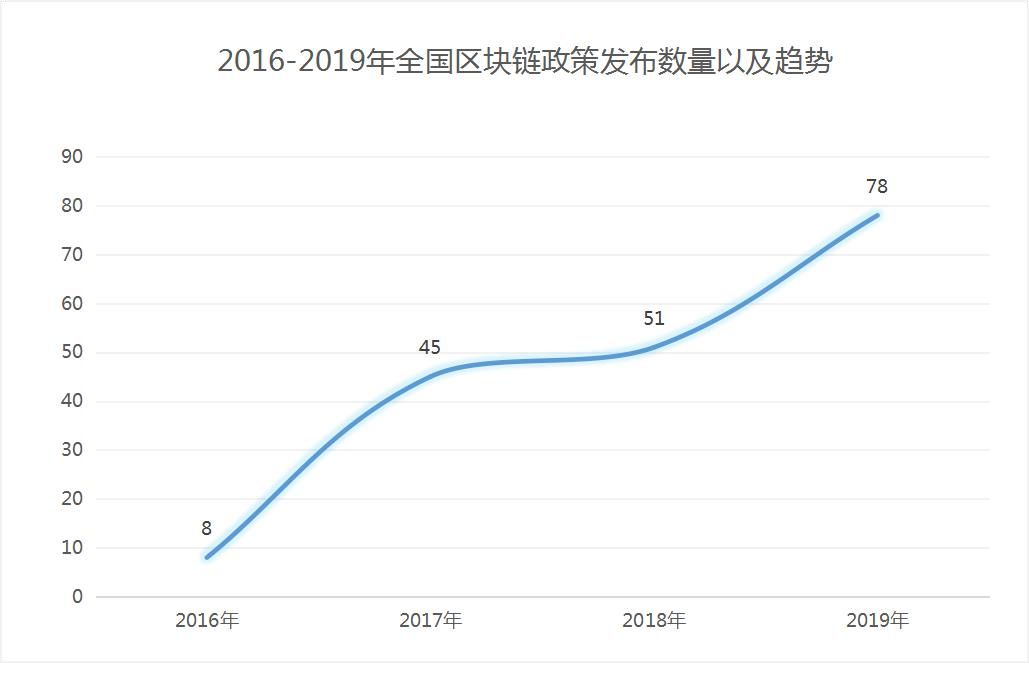
Data source: Internet Information Office, CCID Research Institute, PANews
After the important speech of 10.24, the mainstream media have made their voices, and the local governments have actively expressed their opinions, thus spreading an unprecedented wave of blockchain learning. As can be seen from the above figure, the blockchain policy has significantly increased in 2019. Local governments across the country have issued 44 related policies to encourage the development of blockchain, involving 20 provinces. Among them, government affairs, medical care, finance and smart cities have become the most important landing areas for local governments.
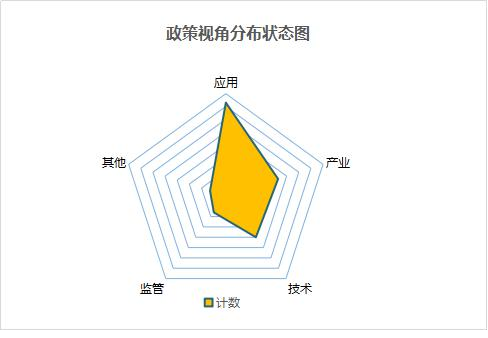 Data source: Internet Information Office, CCID Research Institute, PANews
Data source: Internet Information Office, CCID Research Institute, PANews
It can be seen from the figure above that there are the most policies on strengthening supervision. "Blockchain has been accompanied by great controversy since its inception. There are both bright prospects brought by the application of technology and dark bubbles brought by speculation. Our government's attitude towards blockchain technology is very clear. On the one hand, , Actively encourage blockchain technology innovation and application development, on the other hand, crack down on virtual currency speculation, ICO, IEO and other illegal activities under the name of the blockchain, and strengthen the supervision of cryptocurrencies and various tokens. To enable the industry to develop healthily, future regulatory policies will have the following characteristics:
Using blockchain technology to supervise the blockchain: The essence of the blockchain is a collectively maintained data ledger. Supervisors can join it to become super nodes and realize hierarchical sharing of data according to their permissions. Supervisors do not have to collect, store, Coordinate and aggregate data to improve the speed and quality of the regulatory review process.
Regulatory technology promotes compliant blockchain: Blockchain will effectively develop the potential for regulatory compliance and corporate compliance, and build trust between different entities. The combination of blockchain technology and big data, cloud computing, artificial intelligence, etc. will comprehensively transform the traditional industry supervision model. The blockchain platform dominated by regulators is the underlying architecture, and all stakeholders (for example, government regulatory agencies such as central banks, public security, industry and commerce) are incorporated into the platform in the form of distributed nodes to achieve on-chain supervision, joint supervision, and real-time Supervision.
Supervision trends are becoming clearer: Supervisory authorities have further strengthened the supervision of illegal fundraising, fraud and other acts in the name of blockchains, and actively develop new supervision technologies and models; at the level of information management, curb from the source Harmful information to netizens, and strictly supervise the transmission of information to prevent various illegal organizations from implementing blockchain fraud through the purchase of search engines or social network push services; at the service provision level, increase software and hardware and peripherals Supervision of service providers such as services, especially for cryptocurrency trading platforms.
In the long run, the supervision of the blockchain industry will continue to develop in the direction of legalization, standardization, comprehensiveness and intelligence.
o2 Quickly promote the establishment of national standards for blockchain
Beginning in 2016, the State Council has issued the “Thirteenth Five-Year Plan” National Informationization Plan. In strengthening the advanced layout of strategic frontier technologies, it has explicitly proposed to strengthen the research and development of new technology and other basic technologies such as blockchain and the frontier layout. Standard setting and patent layout. According to the "China Blockchain Technology and Application Development White Paper" released in 2016, the "blockchain standard system framework" is mainly divided into basic standards, business and application standards, process and method standards, credible and interoperable standards, and information security. Standard 5 directions.
At present, there are 1 national blockchain standard, 16 blockchain group standards, and 13 blockchain industry standards. Among them, half of the standards belong to business and application standards; 25% belong to basic standards, including ISO's "Terms and Concepts", "Reference Architecture", "Reference Architecture of Blockchain and Distributed Ledger Technology" of China Electronics Technology Standardization Institute, etc. 16% belong to information security standards, such as CCSA's "Technical Requirements for Blockchain Platform Security", "Technical Specifications for Blockchain Digital Asset Storage and Interaction Protection", "Blockchain Privacy" of China Blockchain Technology and Industry Development Forum Protection norms ". At present, China's research on blockchain technology standards is still at the "basic standards" level (terms, reference architectures, etc.). There is less development of standards involving credibility, interoperability and processes, and there is a certain foundation in standards for password application services. .
At present, China is starting to establish national standards for the blockchain to promote the construction of the blockchain standard system from the top-level design. On November 20, 2019, the National Standardization Commission established a group of national professional standardization technical committees. At the same time, around the hot areas of social concern such as blockchain technology, sharing economy, baby products, etc., the National Standards Commission has also accelerated the construction of standardized technical organizations, and initiated the establishment of a number of technical committees such as blockchain and distributed accounting technology. , Is currently underway in an orderly manner.
o3
The fever of investment and financing in the blockchain field has climbed, and investors have become more rational
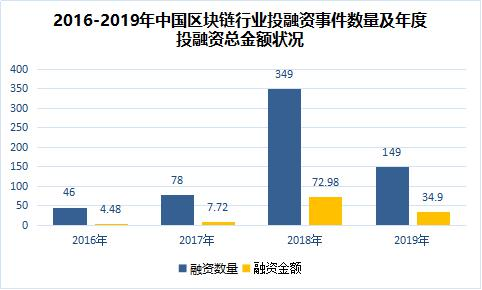
Data source: Zero One Think Tank
According to incomplete statistics of the Zero One Think Tank, the capital side's investment in blockchain companies / projects has gradually become rational. Compared to November 2017 to October 2018, the number of financing events decreased by 50% year-on-year, and the amount of financing decreased by 75% year-on-year. From November 2017 to October 2018, the number of Chinese blockchain companies / project financings reached 349, with a total financing amount of 17.078 billion yuan. From 2016 to 2019 (as of October 2019), the amount of financing and the amount of financing in China's blockchain industry are generally on the rise, and there is a high correlation between the amount of financing and the amount of financing. Since 2016, the amount and amount of financing in the blockchain industry have started to rise significantly. In 2018, the “explosion year” for financing blockchain projects, the number of financing reached 349, with a growth rate exceeding 340%, and the amount of financing was 17.3 billion The growth rate was as high as 876%; in 2019, the development of the blockchain industry returned to rationality, and the amount of financing and the amount of financing fell significantly.
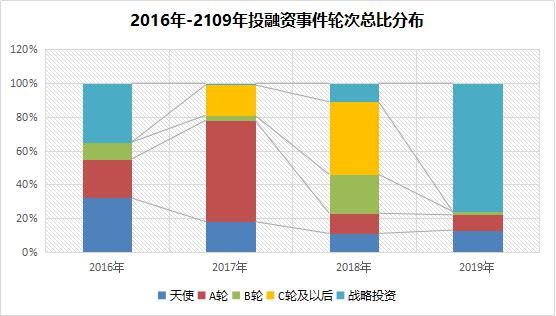
Data source: Zero One Think Tank
From 2016 to 2019, in terms of the amount of publicly disclosed financing, seed / angel round financing has gradually declined, from over 40% in 2013 to less than 15% in 2019. The proportion of financing increased after the C round in 2017, and the strategic investment growth in 2019 is obvious, which is a sign that the market is becoming more rational. As the state suppresses speculative speculation and the industry gradually regulates, blockchain investment in the future will become more rational.
o4 core technology needs to be breakthrough, BaaS market grows fast
As of March 2019, the number of Chinese blockchain companies is second only to the United States, reaching 499 and 553, respectively, mainly concentrated in developed eastern regions such as Beijing, Shanghai, Guangdong, and Zhejiang. The construction of blockchain infrastructure often requires companies to have strong technical strength and the foresight of technological development. From the industry map, it can be seen that there are very few companies participating in infrastructure. According to the statistics of the inter-chain pulse, the current companies that deploy the underlying infrastructure of the blockchain are only BATJ, Thunder and 360. Compared with foreign excellent public chain projects, domestic public chain platforms are still following. Although domestic companies have independently developed platforms such as CITA, Bubichain, BROP, BCOS, ChainSQL, etc., most companies develop and improve based on foreign open source blockchain products such as Bitcoin, Ethereum, and Hyperledger.
In fact, problems such as insufficient performance, insufficient security, and difficulty in interconnection and interoperability of the blockchain platform have put forward higher requirements on key technological breakthroughs such as consensus algorithms, cryptography, and cross-chain. From the latest blockchain technology concepts and solutions, See, such as PoS, DPoS consensus algorithms, sharding, zero-knowledge proof, DAG, sidechain, lightning network and other technical solutions, most of them are proposed by foreign technology communities, and domestic technology communities follow and imitate, and rarely belong to Chinese original or First proposed. China urgently needs to make breakthroughs in key blockchain technology, and then promote the implementation of blockchain technology in larger-scale business scenarios.
Due to the rapid increase in demand for blockchain application development, Internet companies such as Huawei, Tencent, Baidu, and JD.com have launched blockchain cloud platforms in 2018, integrating blockchain, big data and cloud computing with each other. Subsequently, many blockchain companies also launched BaaS in vertical industries. In the future, market participants will maintain the trend of coexistence of cloud giants and vertical BaaS. With the gradual increase in R & D investment, domestic research teams have made innovations and breakthroughs in the platform's underlying platform architecture, consensus algorithms, password security, and performance security. With the continuous expansion of cloud platform construction and the continuous upgrading of cloud computing technology, the future blockchain BaaS platform will usher in a rapid growth phase. Related data indicates that the overall scale of the blockchain BaaS platform is expected to reach the level of 10 billion US dollars.
The o5 alliance chain has developed smoothly, opening up more application scenarios
The participants in the blockchain industry include:
1) Open source frameworks such as Ethereum and Hyperledger Fabric;
2) Blockchain platforms provided by Ant Blockchain, Ping An, Tencent, Wanxiang, etc .;
3) Startups focused on industry applications.
The development of China's blockchain industry has certain advantages compared with foreign countries. In addition to China's accumulated advantage in mobile Internet, an important reason is that many Chinese enterprises have chosen the development path of the alliance chain. The alliance chain has not been favored by everyone for a long time, but it has developed smoothly in the past year or two, opening up many application scenarios. This also proves the feasibility of the technical route of the alliance chain from the side. Compared with the public chain technology, the development of the alliance chain may be a more realistic way to promote the application of technology.
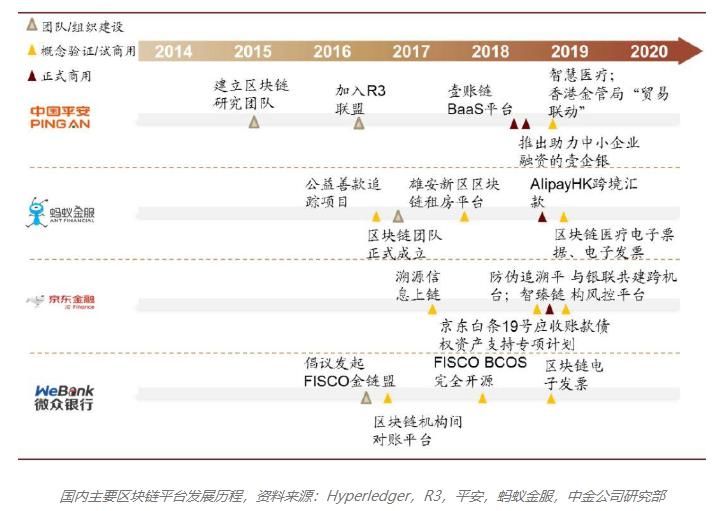 <As can be seen from the above figure, the alliance chain has experienced explosive growth in the past two years, but this does not mean that the technology is mature. Most projects are still in the stage of exploring business models. The main business models include: 1. Group's own existing business efficiency; 2. Provide solutions for governments and financial institutions; 3. Provide cloud services to SMEs. According to statistics from IPRdaily and incoPat, Chinese companies accounted for 75% of the top 20 global public blockchain patents in the first half of 2019.Among them, Ant Financial, Ping An of China, Tencent, Wanxiang and other companies occupy the blockchain platform technology. leading position. According to our incomplete arrangement, 66 companies in A / H / China Stocks have blockchain-related businesses. Among them, companies with larger market capitalization include Alibaba, Tencent, Ping An, Hang Seng Electronics, Aerospace Information, ZhongAn Online, etc., in the future. How it will benefit remains to be further studied.
<As can be seen from the above figure, the alliance chain has experienced explosive growth in the past two years, but this does not mean that the technology is mature. Most projects are still in the stage of exploring business models. The main business models include: 1. Group's own existing business efficiency; 2. Provide solutions for governments and financial institutions; 3. Provide cloud services to SMEs. According to statistics from IPRdaily and incoPat, Chinese companies accounted for 75% of the top 20 global public blockchain patents in the first half of 2019.Among them, Ant Financial, Ping An of China, Tencent, Wanxiang and other companies occupy the blockchain platform technology. leading position. According to our incomplete arrangement, 66 companies in A / H / China Stocks have blockchain-related businesses. Among them, companies with larger market capitalization include Alibaba, Tencent, Ping An, Hang Seng Electronics, Aerospace Information, ZhongAn Online, etc., in the future. How it will benefit remains to be further studied.
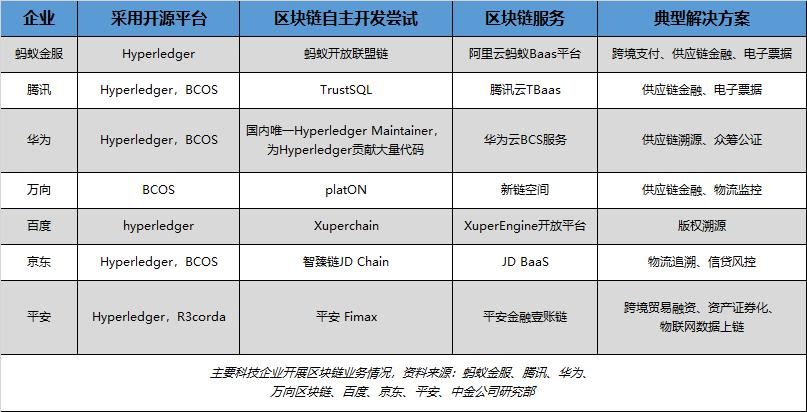
o6
Blockchain patent innovation
Globally: China has the world's largest number of patent innovations, and the underlying technology innovation is weak.
From a global perspective, as of November 27, 2019, according to the statistics of the Incopat database, among the number of blockchain patents published in various countries, China's patent innovation in the blockchain industry is in a leading position in the world, and the total number of patents has reached 1894 cases, far more than the total number of patents in various countries.
In addition, in terms of trends, from 2016 to 2019, the application of China's blockchain is on the rise, reflecting that China is accelerating the innovation and development of the blockchain field in recent years. Among them, in 2018, China's patent innovation reached its peak in four years, with 776 patents. In addition, in 2019, the number of patents in the field of blockchain in all countries has declined significantly under the conditions of increased supervision by various countries and a stricter industry environment.
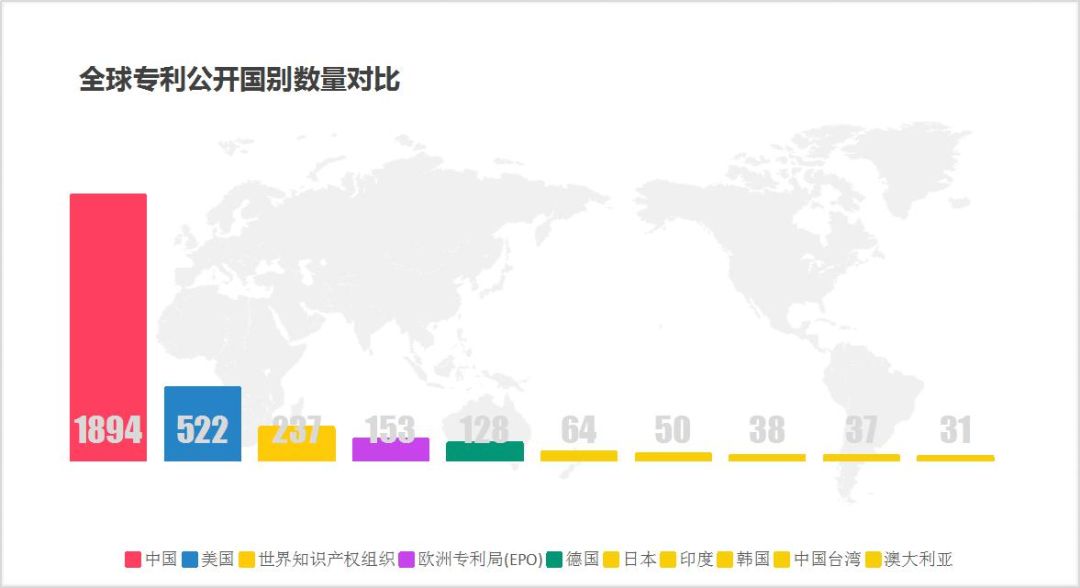
Data source: Incopat
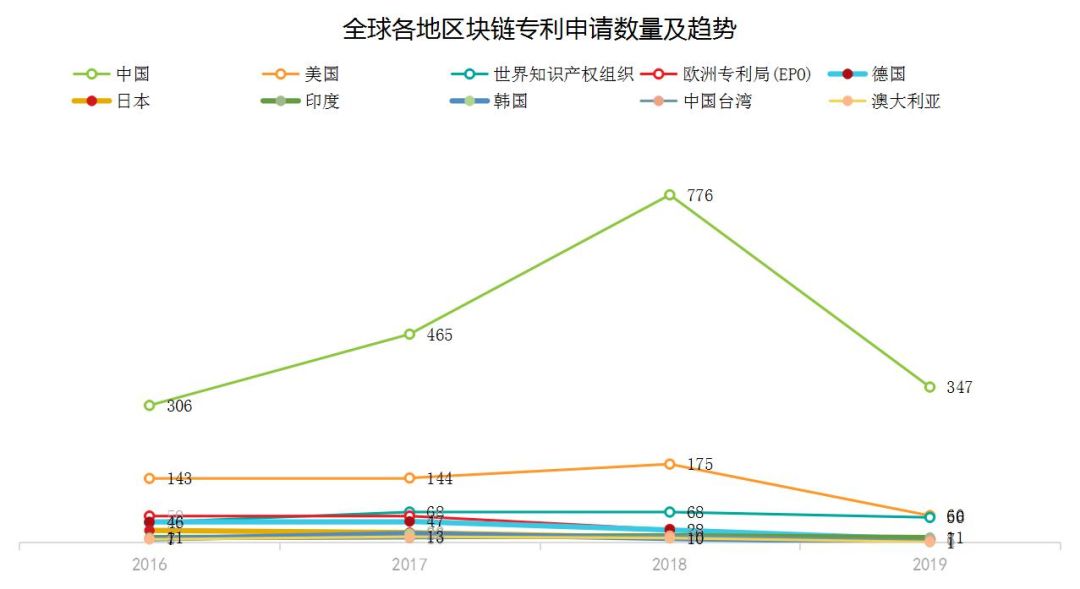 Data source: Incopat
Data source: Incopat
At present, patent innovation applications on the blockchain have covered 30 domestic provinces and cities, and Guangdong, Beijing, Jiangsu, Zhejiang, Shanghai, Sichuan and other places continue to lead the number of patents. In addition to the better infrastructure in terms of policies, economics and trade, and other social environments, these regions also have the advantage of scientific research institutions and talents to provide a steady stream of energy for technological innovation in these regions. In terms of the number of patents from 2016 to 2019, it has always been at the forefront of all provinces and cities, with a total of 326 patent applications, and Beijing has ranked 272 behind. In terms of trends, Zhejiang, Beijing, Guangdong and other places will vigorously develop patent innovation potential after 2017. Among them, cities represented by Hangzhou and Chengdu have prioritized the establishment of the digital city concept in the new round of urban competition, laying the foundation for the innovative development of blockchain technology under the digital social infrastructure construction and digital economy development strategy.
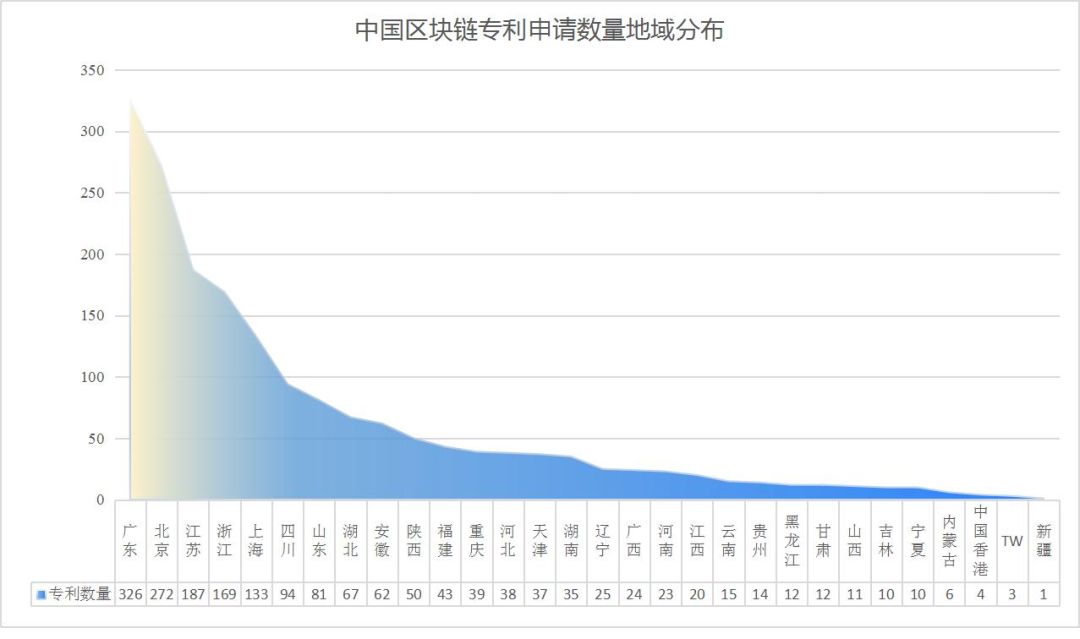
Data source: Incopat
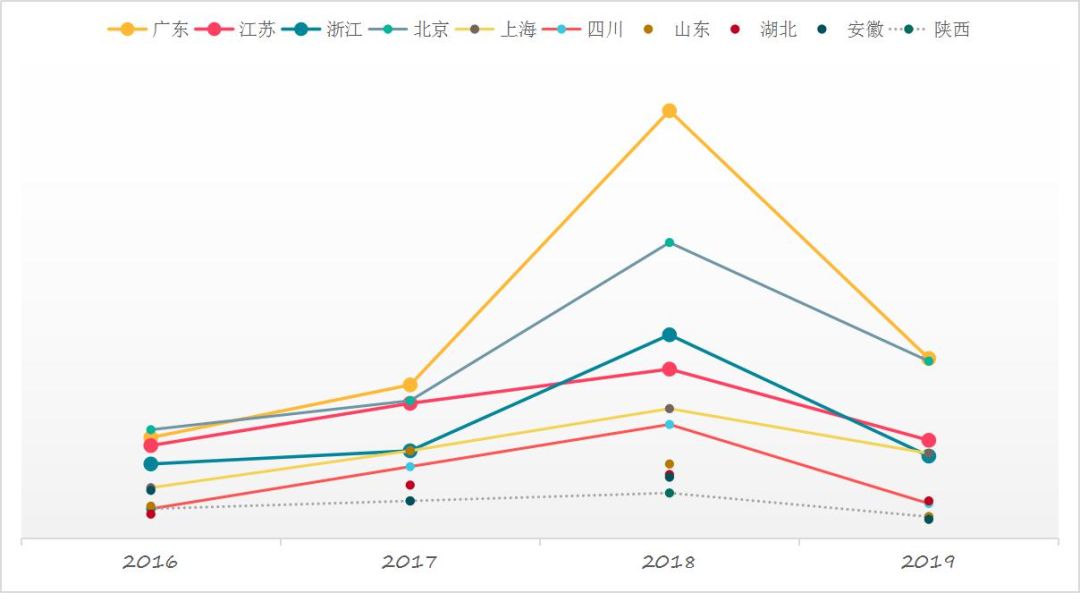
Data source: Incopat
In addition, according to the latest release of the 2019 China Blockchain Patent Comprehensive Strength List released by Chain Tower, Alibaba ranks first, Financial OneAccount ranks second, and China Unicom ranks third. The remaining companies on the list include Ping An Technology, Complex Midea, Yuanzheng Technology, Baidu, Tencent Technology, and Weizhong Bank. Overall, each company in the list has its own focus in the patent field. Alibaba's outstanding performance in terms of the number of patent applications and the scope of patent layout helped it to top the list. Financial OneAccount is an absolute leader in patent accumulation and industry application in the field of financial technology. Alibaba and Financial OneAccount are on par with each other in terms of the number of patents granted, and both have obtained eight patents. China Unicom focuses on the application of blockchain in communication networks and derivative scenarios, and has patents specifically for the privacy protection of communication network users.
In the implementation of patented technology, the industry has emerged with representative cases: including the blockchain trade financing network project eTradeConnect, which is cooperating with Financial One Account and the Hong Kong Monetary Authority, and the Tianjin Port Blockchain, which is cooperating with Financial One Account The pilot project and AlipayHK is a cross-border payment platform based in Hong Kong. Several cases have taken the form of alliance chains, opened up public power and company data, achieved on-chain collaboration, and improved privacy protection and platform performance through technical solutions.
o7 Development of blockchain companies
There are nearly 28,000 blockchain companies across the country, with Beijing, Shanghai, Guangzhou and Shenzhen as the core gathering place.
From an enterprise perspective, according to the "Blue Book of Blockchain: China Blockchain Development Report (2019)" statistics, there are nearly 28,000 blockchain companies across the country, of which North Shanghai, Guangzhou and Shenzhen are the core gathering places, and Guangdong Blockchain is registered. Enterprises account for over 50% of the nation's blockchain-registered enterprises, with a total of 16,353. There are 3242 blockchain-related companies in the Yangtze River Delta region (Shanghai, Zhejiang, Jiangsu, and Anhui). Hainan Province is a policy-oriented area with a total of 902 related companies.
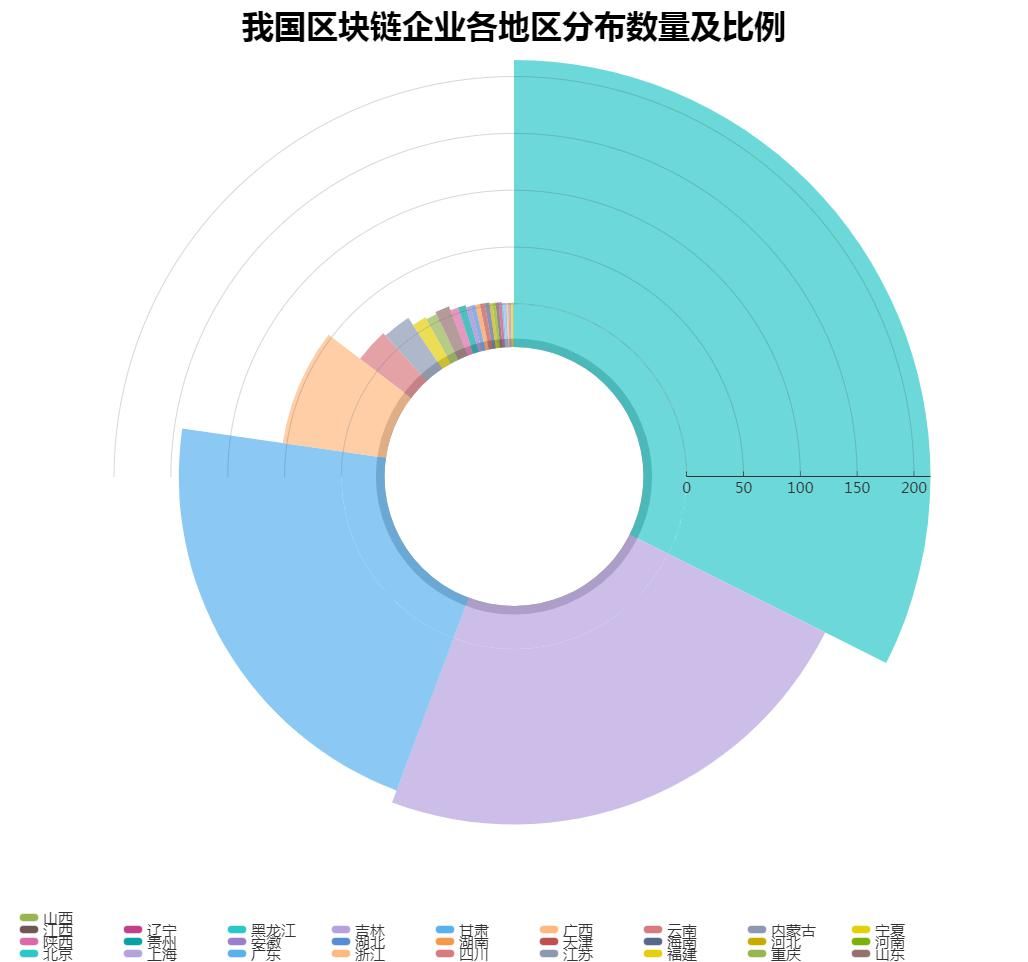
Data source: "Blue Book of Blockchain: China Blockchain Development Report (2019)"
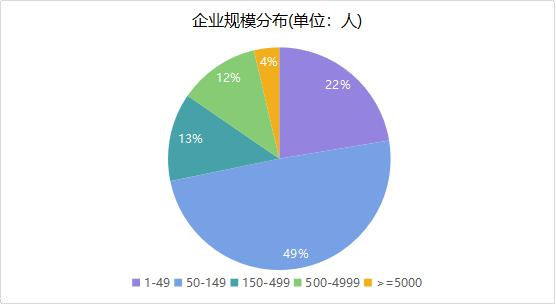
Data source: Zero One Think Tank
According to data collected by the State Administration for Industry and Commerce's enterprise information query platform in June this year, in terms of the number and proportion of the distribution of blockchain companies in various regions of the country, China is engaged in providing the underlying technology platform services, application products, and industrial technology solutions of the blockchain industry There are a total of 704 blockchain companies with input and output services, such as program services, mainly in Beijing, Shanghai, Guangdong, Zhejiang, Sichuan, Jiangsu and other places. There are 638 blockchain companies in Beijing, Shanghai, Guangdong, Zhejiang, Sichuan, Jiangsu and other places, accounting for about 90% of the total number of blockchain companies in the country. According to the statistics of the Zero One Think Tank, the number of enterprises between 50 and 149 accounts for 40.06% of the total, and the scale of enterprises is generally small.
In Q3 2019, there were more than 70,000 blockchain companies, a quarter-on-quarter increase of 265%.
According to the data of the chain tower, as of September this year, the number of domestic and blockchain-derived related companies exceeded 100,000. In the third quarter of 2019 alone, related companies surged more than 70,000, and the growth rate increased by 265% from the previous quarter.
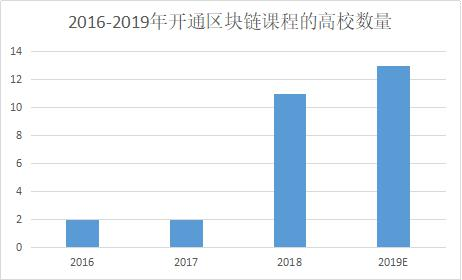
Data source: Chain Tower Think Tank
Among them, various industries have entered the blockchain industry one by one or used the blockchain technology to improve their own business systems, and the development of "blockchain +" in various industries is coming out. Among them, Alibaba, Tencent, JD.com, Ping An Group, and Xunlei and other giant companies are particularly prominent in blockchain technology. For example, Alibaba's Alibaba Cloud and Ant blockchain medical solutions were first applied to future hospital electronic prescriptions; CITIC Notary Office issued the first national blockchain notary certificate in Beijing; China Copyright Protection Center cooperated with Sina Weibo, Thunder, Internet platforms such as JD Mall released the China Digital Copyright Unique Logo (DCI).
o8 Development of Blockchain Industrial Park
Four major gathering areas, 26 blockchain industrial parks
According to incomplete comprehensive statistics, as of October this year, there were 26 blockchain industry parks across the country, forming four major gathering areas in the Yangtze River Delta, the Pearl River Delta, the Bohai Rim, and the Hunan, Jiangxi and Chongqing. The Yangtze River Delta region is represented by Shanghai and Hangzhou, with 11 blockchain industrial parks; the Pearl River Delta region is represented by Guangzhou, with 4 blockchain industrial parks; 3 blockchain industrial parks are located in the Bohai Rim region; There are 7 blockchain industrial parks in the central and western regions represented by Changsha and Chongqing. In addition, Hainan has set up a Hainan Free Trade Zone (Hong Kong) blockchain trial zone in the ecological software park.
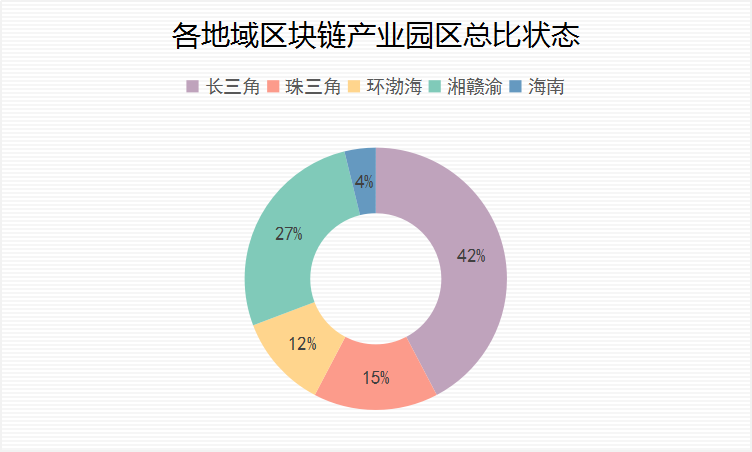
Data source: PANews, Gyro Research Institute
According to the information released by the China Commercial Industry Research Institute in August 2019, the overall development of the domestic blockchain industry parks presents a clear “staircase” feature, which can be divided into three echelons: the first echelon of each park The comprehensive competitiveness scores are all above 95 points. Among them, the total scores of Hangzhou Blockchain Industrial Park in China, Guangzhou Antmi Blockchain Maker Space and Shanghai Blockchain Technology Innovation and Industrialization Base are over 100 points. The comprehensive competitiveness score of each park in the second echelon is between 87 and 95. It is still dominated by industrial parks in coastal cities such as Shanghai, Hangzhou, Suzhou, Guangzhou, and Qingdao; the comprehensive competitiveness score of the third echelon is below 87 points. Most of the blockchain industrial parks are concentrated in inland cities such as Changsha, Wuhan, and Ganzhou, and a few smaller industrial parks are concentrated in coastal cities. Overall, the gap between the first and second echelons is not large, but there is a large development gap between the development of the first and second echelons.
0 9 Alliance Organizations and Service Agencies
On November 26, the Tsinghua Yangtze River Delta Research Institute New Economic Development Research Center Advanced Blockchain Research Institute was established in Hangzhou, which is another milestone in the development of the blockchain industry in the Yangtze River Delta region. According to the CCID Blockchain Research Institute, there are currently 68 blockchain research institutions in China, of which there are many blockchain research institutions in Beijing, Hangzhou, Shanghai, Shenzhen, and Guiyang. The main bodies of China's blockchain research institutions are mainly universities and enterprises, and some provinces and cities have also established corresponding blockchain research institutions, but there are relatively few national-level blockchain research institutions.
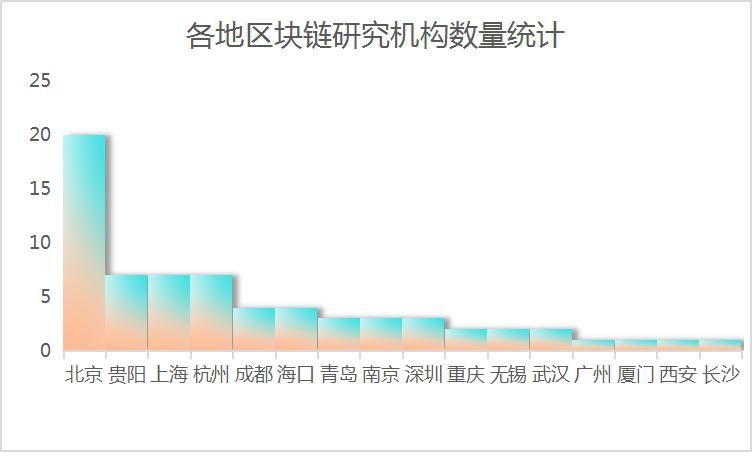
Data source: PANews, Gyro Research Institute
As can be seen from the figure above, the research institutions are mainly concentrated in cities with developed economies and friendly technology, among which Beijing is far ahead.
10 scientific research in universities
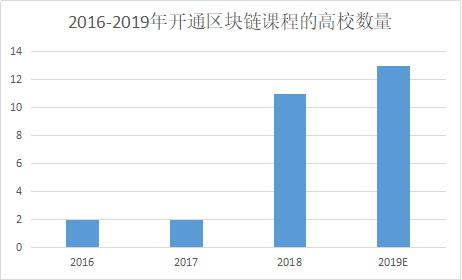
Data source: Gyro Research Institute
With foreign counterparts, related high-end talents are currently scarce. With the rise of blockchain technology as a national strategy, it is necessary for universities to add blockchain courses. Chinese universities have long recognized the application value of this innovative technology of blockchain. Tsinghua University opened relevant courses in 2016, and the number of universities offering relevant courses in the following years has continued to increase. Especially in 2018, compared with 2017, there was a larger increase.
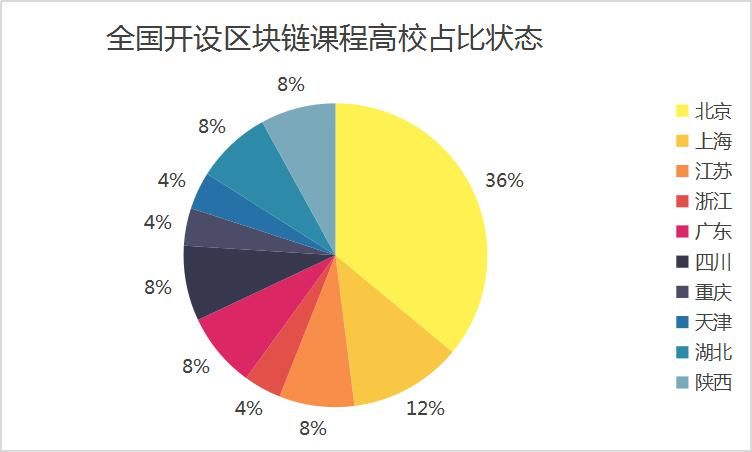
Source: CCID Research Institute, Gyro Research Institute
As of November 10, there are currently about 30 colleges and universities offering related courses, most of which are concentrated in Beijing and Shanghai, and Beijing universities account for 42%. With the rise of the blockchain as a national strategy, I believe that the number of people offering relevant courses will gradually increase in the future, laying the foundation for the future development of the industry.
11Insufficient supply of jobs in the industry, scarce high-end talent
China's blockchain technology research is in sync with other countries in the world, and its future development depends largely on talent supply and reserves. In 2018, the stock of talents who truly possessed blockchain-related skills and work experience only accounted for 7% of the demand. With a large amount of capital entering the blockchain industry in 2018, the concept of blockchain and related companies were put on the limelight for a while. According to the 2019 Blockchain Talent Demand Report released by Zhilian Recruitment, the recruitment demand in 2019 has also returned to rationality as the bubble subsided. The number of recruiting companies has started to increase negatively year-on-year since the first quarter of 2019. Began to turn positive to negative in the second quarter of the year.
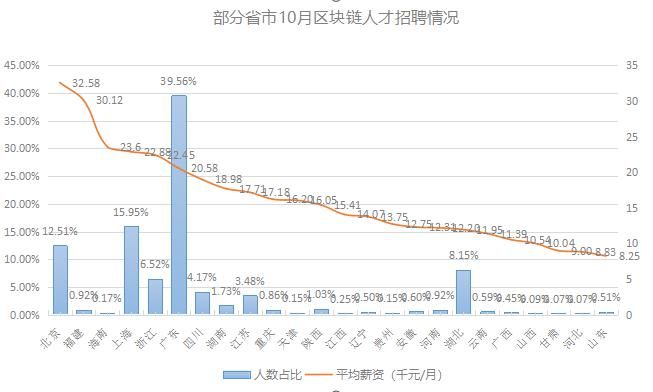
Data source: Zero One Think Tank
In the third quarter of 2019, the number of companies recruiting blockchain-related talents and the number of recruiters decreased by 53.68% and 51.71% year-on-year, respectively, and demand was basically concentrated in Beijing, Shanghai and Guangdong. Although employment demand has shrunk during the bubble year-on-year, it is still much higher than 2017, and the overall scale of demand has remained stable for a long time.
The blockchain field continues to attract a large number of talents to apply for jobs. In the third quarter, the number of job seekers was 7.12 times the demand.
Although the rectification of the industry has reduced the enthusiasm of job seekers, the blockchain field has been attracting the attention of job seekers for a long time. The supply scale is far greater than the demand. In the third quarter of 2019, the number of job seekers on the blockchain was 7.12 times the number of job seekers. The phenomenon of blind follow-up still exists. Due to the newer technology and less historical precipitation, the stock of talents with corresponding knowledge structure and work experience is still rare at this stage. Talent training and formulating talent standards are the next important development points.
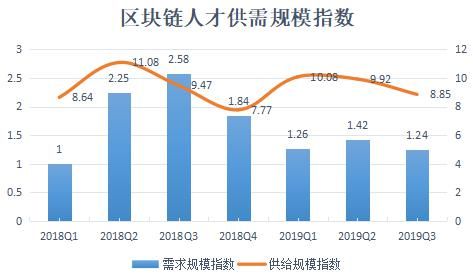
Data source: "Blockchain Talent Demand Report 2019"
The stock of talents is mainly distributed in the Internet / e-commerce industry, echoing the logic of the underlying technology of the blockchain. In addition to the above analysis of the supply and demand sides of blockchain talents, we also conduct a special analysis of the blockchain talents (that is, those with blockchain-related knowledge, skills, or experience in the industry), and try to depict the blockchain practitioners' talents. Actual portrait. According to the big data of Zhilian Recruitment, the source of blockchain talents is mainly concentrated in the Internet / e-commerce industry, accounting for 40.19%, followed by the computer software industry, accounting for 16.36%, and the fund / securities / futures / investment industry, accounting for 11.10%. The Internet and computer software industry echoes the underlying technology logic of the blockchain and has become a major source of talent. The stock of talent in the fund / securities / futures / investment industry benefits from the outbreak of the financial industry in the early stage of the blockchain industry, providing more experienced talents for the blockchain.
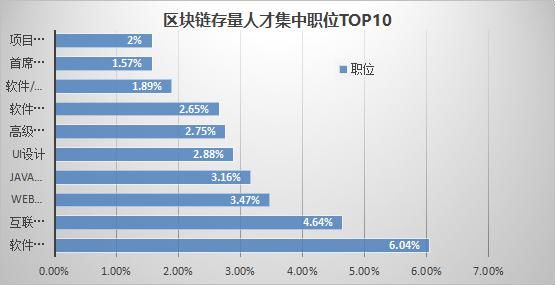
Data source: "Blockchain Talent Demand Report 2019"
Among them, the current positions of blockchain stockists are in the top positions: software engineer, internet product manager / supervisor, web front-end development, and Java development engineer, which account for 6.04%, 4.64%, 3.47%, 3.16, respectively. %, These positions belong to the Internet / e-commerce and computer software industries. The majority of the existing talents have a bachelor's degree, accounting for 56.18%, a master's degree or above accounting for 18.57%, followed by a college degree accounting for 22.22%.

We will continue to update Blocking; if you have any questions or suggestions, please contact us!
Was this article helpful?
93 out of 132 found this helpful
Related articles
- People's Daily Observation: How Manufacturing Plants Blockchain
- Can the founders easily take half of the "decentralized scam" that raised 30 million?
- Amun AG receives regulatory approval again to provide cryptocurrency ETP products in EU countries
- Popular science | Amazing, how can digital currency pay offline
- CCTV News: To build a new engine for high-quality development, General Secretary Xi Jinping has "numbers" in mind
- The technical route of the central bank's digital currency may have been confirmed, and ICBC shoulders the heavy technical burden
- Babbitt College × Weizhong Bank Open Course 丨 Talents become the bottleneck of blockchain landing, multi-field exploration technology integration






